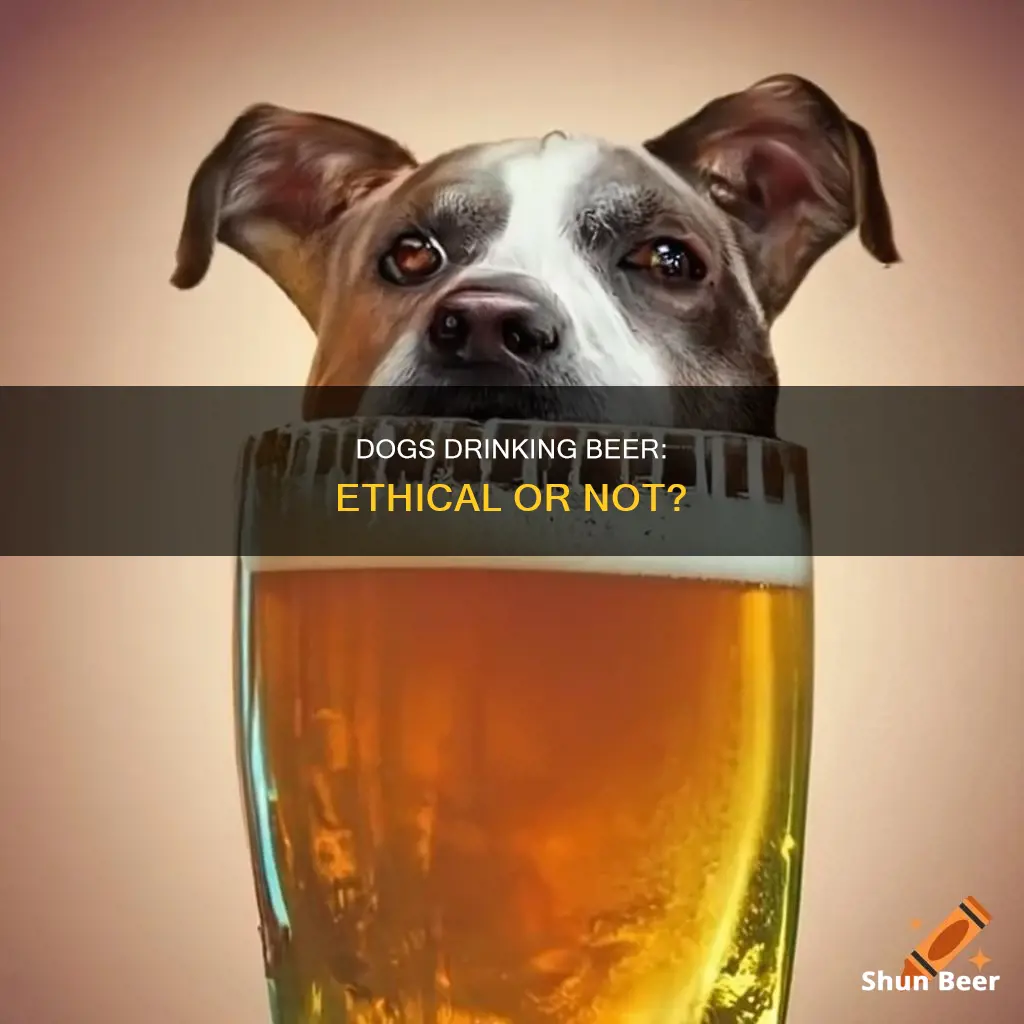
While some people may find it amusing to let their dogs drink beer, it is essential to understand the potential consequences and ethical implications of this action. Beer and other alcoholic beverages can be highly toxic to dogs, and even a small amount can lead to alcohol poisoning, causing severe health issues and, in rare cases, death. With dogs being naturally curious and attracted to sweet tastes, it is the owner's responsibility to keep alcoholic drinks away from their canine companions. So, is it unethical to let dogs drink beer? The answer is yes, as it puts the dog's health and wellbeing at risk, and owners have a duty of care to ensure their pets' safety.
| Characteristics | Values |
|---|---|
| Alcohol toxicity in dogs | Not common |
| Dogs' attraction to alcoholic drinks | Sweet taste, smell of beer, or desire to consume what their owners are consuming |
| Beer for dogs | Alcohol-free, composed of water, bone broth, vegetables, fruit, oats or barley, herbs, and sometimes dog-safe nuts |
| Beer for humans | Toxic to dogs, even in small amounts |
| Beer ingredients | Ethanol, or grain alcohol |
| Alcohol poisoning symptoms in dogs | Vomiting, disorientation, lack of coordination, tremors, seizures, lethargy, decreased breathing rate, low body temperature, abnormalities in the electrolytes |
| Treatment for alcohol poisoning | Induce vomiting (within 15 minutes of ingestion), veterinary care |
What You'll Learn

Beer is toxic to dogs
Alcohol gives humans a dizzy, tipsy, wobbly feeling, and the same happens to dogs. However, in dogs, this is a sign of poisoning. A dog that has consumed beer may seem confused, have difficulty walking and standing, and become lethargic. They may also vomit, have a decreased breathing rate, low body temperature, and abnormalities in their electrolytes due to dehydration. In addition, low blood sugar may develop, resulting in body tremors and seizures. In severe cases, alcohol intoxication in dogs can cause organ failure and even death.
If a dog appears drunk after drinking beer, it is important to take them to the veterinarian right away. Do not let them "sleep it off". At the veterinary hospital, a veterinarian can help hydrate the dog, regulate its blood sugar levels and body temperature, and provide supportive care.
To prevent dogs from consuming beer, it is important to keep alcoholic drinks out of their reach and not leave them unattended. If you have guests over, ensure they know not to give the dog any alcohol.
Beer and Prep: What's the Deal?
You may want to see also

Dogs can quickly develop alcohol poisoning
The signs of alcohol poisoning in dogs include vomiting, disorientation, lack of coordination, tremors, and seizures. Alcohol ingestion can also lead to decreased breathing rate, low blood sugar, low blood pressure, and hypothermia. If your dog is showing any of these symptoms, it is important to seek immediate veterinary assistance.
To prevent alcohol poisoning in dogs, it is crucial to keep alcoholic beverages out of their reach and never leave them unattended. If you suspect your dog has ingested alcohol, contact your veterinarian right away. Do not try to treat alcohol poisoning at home, as it can be life-threatening.
While humans might enjoy a cold beer, it is important to remember that even a small amount of alcohol can be toxic to dogs. Their smaller size and different physiology mean that alcohol can affect them much more quickly and severely than humans. Therefore, it is essential to keep alcoholic beverages away from dogs and never deliberately offer them as a treat.
Beer and High Blood Pressure: What's the Connection?
You may want to see also

Alcohol can cause almost immediate symptoms in dogs
The amount of alcohol and the weight of the dog are key factors in determining how quickly alcohol poisoning can occur. Smaller dogs are more susceptible to poisoning, with only a few licks of beer being enough to cause signs of drunkenness. Dogs may also be attracted to fruit-based drinks, cocktails, punches, ciders, and seltzers, which can contain higher levels of alcohol. Additionally, diet alcoholic beverages may contain xylitol, an artificial sweetener that is highly dangerous and potentially fatal for dogs.
If your dog exhibits any signs of alcohol poisoning, it is crucial to seek immediate veterinary assistance. In cases of ingestion within the last 15 minutes, a veterinarian may induce vomiting to remove the alcohol from the dog's digestive system. If your dog is staggering or disoriented, take them to the emergency vet right away.
It is important to prevent dogs from accessing alcoholic beverages. This can be done by putting them in another room or in their crate when consuming alcohol, storing alcohol out of their reach, and never leaving alcoholic drinks unattended.
Beer Before Bed: A Good Night's Sleep?
You may want to see also

Dogs can absorb alcohol through their skin
It is unethical to let dogs drink beer, as even a small amount can be toxic and cause alcohol poisoning. Dogs can absorb alcohol through their skin, or by drinking it, and it can quickly lead to severe health issues and even death in rare cases.
Dogs are attracted to beer because of its sweet taste and smell. They may also be interested in drinking beer because their owners are. However, beer is toxic to dogs and can cause alcohol poisoning, even in small amounts. The ethanol produced during the fermentation process gives humans a dizzy, tipsy feeling, but it takes far less for animals to develop poisoning.
Dogs can absorb alcohol transdermally, through their skin, and do not need to drink it to be affected. The effects on dogs are similar to those on humans, but dogs are affected much more quickly, usually within 30 minutes. Dogs do not know what to expect when they drink beer, and the impact can be severe.
The amount of alcohol and the weight of the dog will determine how quickly alcohol poisoning develops. For toy breeds, a smaller amount of alcohol is considered dangerous compared to larger breeds. Dogs can appear drunk, confused, and have difficulty walking and standing. They may also experience lethargy, decreased breathing rate, low body temperature, and abnormalities in electrolytes due to dehydration.
If you suspect your dog has consumed alcohol, contact your vet immediately. Do not try to treat alcohol poisoning at home. The vet may induce vomiting to help remove the alcohol from the dog's digestive system.
Beer and Lithium: Safe After a Wait?
You may want to see also

Beer should be kept away from dogs
Dogs respond to the effects of alcohol much like humans, and the impact is often mild. However, it can also be life-threatening. Signs of alcohol poisoning in dogs include vomiting, disorientation, lack of coordination, tremors, and seizures. If your dog exhibits any of these symptoms after consuming alcohol, contact your veterinarian or an emergency clinic immediately. Do not try to treat alcohol poisoning at home.
To prevent your dog from accidentally consuming alcohol, take some simple precautions. Keep your beer or alcohol stored away from your dog, out of their reach. Don't leave alcoholic drinks unattended, and be sure to clean up after yourself. If you're having guests over, pay attention to your dog, and consider putting them in another room or their crate to keep them away from the beer.
While it may seem fun to share a drink with your furry friend, it's important to remember that beer and other forms of alcohol are harmful to dogs. Instead, stick to dog-safe drinks like water or specially made dog beers, which are alcohol-free and made with ingredients like bone broth and vegetables.
Beer and Lifting Weights: A Healthy Balance?
You may want to see also
Frequently asked questions
Yes, it is unethical to let dogs drink beer. Beer is toxic to dogs and can cause alcohol poisoning, which can be fatal.
Signs of alcohol poisoning in dogs include vomiting, disorientation, lack of coordination, tremors, and seizures. If you notice any of these symptoms, contact an emergency vet immediately.
If your dog drinks any alcohol, contact your vet straight away. Do not try to treat alcohol poisoning at home. If it has been less than 15 minutes since ingestion, a vet may induce vomiting to help remove the alcohol from your dog's digestive system.
To prevent your dog from consuming alcohol, put your dog in another room or in its crate when you are drinking. Store alcohol carefully, out of your dog's reach, and do not leave alcoholic drinks unattended.
Yes, there are dog-safe alternatives to beer, such as "dog beers," which are alcohol-free and made mostly of water and bone broth. Plain water is also a safe and healthy option for dogs.







